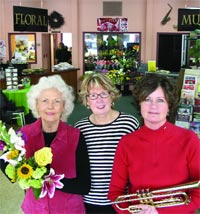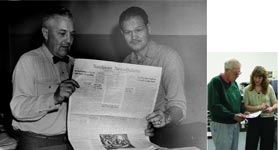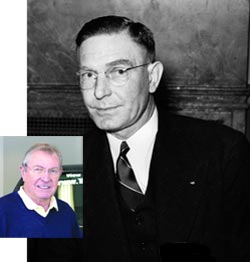They've got business in their blood
The generations of Sandpoint businesses
By Marianne Love
What's it take to weather good times - and bad - in Sandpoint's business world? Well, there are a few common ingredients shared by businesses that make it here, year after year through the decades. They include hard work, consistent service, an ability to adapt and a commitment to the community.
For those that master the recipe, their business becomes a family affair, handed on from one generation to the next. Meet a few of who did just that.
Niemans (1920): William Nieman knew candy and cooking. His son Hud knew music. Both combined their expertise with the perennial demand for flowers and succeeded with a Sandpoint business that has thrived for 85 years.
William and Maybelle Nieman arrived in Sandpoint by train from Milwaukee, Wis., in 1910. During William's Navy hitch, he had served as a cook and learned to make candy. Hence, Palm Confectionary opened its doors, featuring sweets and a soda fountain on First Avenue near present-day Larson's. In the mid-1920s, Maybelle added the flower department, taking over an existing floral business from the Hurshell Weaver family (founders of Hope's Litehouse). The business had moved to its present Cedar Street location. When Hud, a trombonist, returned to Sandpoint from traveling with the big bands after World War II, he added the music section, dropped the soda fountain and developed the school band instrument-rental program. His daughter-in-law, Wendy, came aboard in 1985.
|
 |
|
From left to right: Lola Nieman, Sharon Selberg and Wendy Nieman in the
present-day store
|
Quick Facts: K.T. Littlefield remembers earning 10 cents hourly as a waitress at Palm and Weaver's Floral Shop. "No bottled Cokes. No soft ice cream. Things were made from scratch," she says. "Lovely plates of hand-dipped chocolates in the show case." Manager Sharon Selberg has been with Nieman's Music and Floral for 30 years. Now, eight full - or part-time employees work with extras over the holidays.
Pietsches (1926): Laurin Pietsch dropped out of Spokane's Lewis and Clark High School during his junior year in 1916 to work for the Spokane Daily Chronicle and help support his family. His decision hatched a three-generation family legacy in the journalism/printing business. While working circulation in northern Idaho/western Montana, he was inspired by a Kellogg newspaper to start his own one-pager in Sandpoint. Partnering with fellow employee J.L. Stack and borrowing $500, he launched The Daily Bulletin in 1924. The mimeograph paper was produced in a shop where City Forum now stands. In 1926, Laurin bought out Stack, organized a team of newspaper carriers and moved to South Second Avenue, where he operated until 1929.
By 1948, the Sandpoint News Bulletin had moved to North Second Avenue (present-day Bank of America location). The business expanded its services when Pietsch bought the Eclipse Printery from Floyd Perks. Laurin's son Gary, meantime, attended the University of Idaho, graduated and spent two years as an Army intelligence officer. Then in 1958, Gary joined his father in the newspaper and printing business, serving in several key positions. His responsibilities included upgrading from letterpress to offset presses. In 1975, Laurin sold the paper to Pete Thompson and retired.
Gary and his wife, Carol, renamed the printing business Selkirk Press and leased additional space for Selkirk Stationery, located across the street at present-day Vanderford's. They sold the stationery store to Vanderford's in 1978. The following year, Selkirk Press was moved to a location on Dover Highway, then on to Oak Street in 1985. In 1995, they moved to the current location on Industrial Drive near Sandpoint Airport, adding a bulk-mailing service in 1998. In 2000 after Gary and Carol's retirement, their daughter, Wesley Dustman, began managing Selkirk Press.
 Left: Laurin Pietsch, on left, with original partner Stan Maxwell in 1956
Left: Laurin Pietsch, on left, with original partner Stan Maxwell in 1956
Right: Gary Pietsch and daughter Wesley DustmanQuick Facts: Laurin's wife, Jean, owned The Fair Lady clothing store next to the Panida from 1951 to '71. Carol Pietsch was an award-winning Sandpoint High School home economics instructor, while son Chris is an award-winning photojournalist in Oregon. Daughter Jaye Schuck is CEO of Litehouse Graphics.
Parkers (1927): Jack Parker of Taylor-Parker Motor Co. has served on numerous local boards. He helped found the fast-growing Panhandle State Bank. He's owned and sold hundreds of vehicles, thanks to his Cedar Street car dealership, established in 1922. Jack started working for his dad, Otis Berkeley "O.B." Parker, cleaning restrooms at Sandpoint Motors Texaco Service Station on 3rd and Cedar (now a showroom).
O.B. bought half interest in Sandpoint Motors for $1,500 when it was located at present-day Di Luna's in 1927. He assumed full ownership the following year. O.B. saw hard times during the Depression, selling just 11 cars in one year. Jack, a University of Idaho grad, took over the dealership in 1957 after his father died from cancer. In 1988, when Greg Taylor bought into the business, the name changed to Taylor-Parker Motor Co. Jack served from then until 1999 as general manager. He now works a few hours weekly, ordering products. |

O.B. Parker, circa 1940 and son Jack Parker, on left |
Quick Facts: In 1927, Chevrolets, Oldmobiles and Nashes averaged $450 new. Thirty years later, Jack sold a 4-door Chevy V8 for $2,200, receiving a stern reprimand from his sales manager for not discounting. Today, cars average $22,000, while SUVs and trucks average $35,000. Present car lot was once three-story Ponderay Hotel. Jack's favorite car: full-sized, bright red 1962 Olds Starfire Holiday Coupe, Rocket V8, bucket-simulated leather seats, floor shift.
Marleys (1943): It was a long good-bye this spring as locally owned Harold's Super Foods closed its doors forever. Ralph Bloom managed the store for 21 years after his father-in-law, founder Harold Marley, was murdered in 1981. Ralph's daughter, Mollie Tenney, took over in 2002 until the closing. During his tenure, Ralph and his late wife, Carol, took just one vacation after winning a two-week trip to Hawaii from Pepsi Cola.
"It's a 24-7, seven-days-a-week job," he said. Ralph's typical day at the store was from 6 a.m. to 9 p.m., followed by two hours cleaning the nearby Spic N'Span Laundromat. Then, I'd start all over again. "I won't miss it, but I'll miss the people." Mollie followed the same pattern, taking only one day off in two years.
During its 62-year run, the store attracted an eclectic mix of loyal customers. Meat, vegetables or assorted dry goods specials; the funky, hometown atmosphere; deli chicken and jojo's; and the management's quiet support of financially strapped patrons endeared the business enough for its closing to inspire numerous eulogies. (See more on Harold's history at mariannelove.com [opens a new window])
Quick Facts: Before managing Harold's, Ralph worked as "go-fer" in the store's wholesale warehouse, drove truck for Darigold and sold real estate.
|